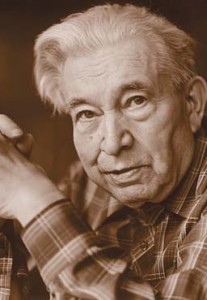 Born in Prague in 1901, Jaroslav Seifert was one of the most noted Czech poets and writers of the 20th Century and received the Nobel Prize in 1984. A critic of the communist regime at heart, he was at the forefront of the avant-garde movement and helped create, and was a regular contributor for, the artistic magazine Devětsil.
Born in Prague in 1901, Jaroslav Seifert was one of the most noted Czech poets and writers of the 20th Century and received the Nobel Prize in 1984. A critic of the communist regime at heart, he was at the forefront of the avant-garde movement and helped create, and was a regular contributor for, the artistic magazine Devětsil.
Brought up in a work class environment, Seifert would experience a period of great upheaval with two World Wars and the rise of the communist state that led to the Cold War. His father worked in a grocery shop and the young Seifert helped him out by delivering goods to the surrounding neighborhood. He was just 16 when the Russian Revolution swept through the East, something that had a strong, formative effect on his early life.
He left school and went to work on the communist newspaper Rudé Pravo, initially fully embracing the new socialist ideals that were beginning to take hold across Europe. By 1923 he had visited Paris for the first time and it fueled his artistic endeavors. Seifert helped to create the movement called Devětsil which attempted to strike literary alliances with soldiers of the new revolution.
In his early days, Seifert was idealistic and it showed in his poetry and in 1921 he published his first collection, City in Tears, which urged a better future for the poor. In 1926, he visited Russia and it prompted him to write the collection The Nightingale Sings Badly and was, in part, influenced by Dadaism and Surrealism.
Over the years, he became more mature in his ideology and was increasingly more critical of the socialist system. He wrote for a number of magazines and newspapers and was married at the age of 27. His new found attitude eventually caused him to be expelled from the Communist Party and Devětsil. For a while his poetry began to branch onto different themes and change in style, moving away from the propagandist and ideological to more telling matters such as love.

He turned more political with imminence of war in 1938, writing the collection Put Out the Lights and, when the country was overrun by the Nazis, he continued to write about the tragedy of Czechoslovakia. Seifert leaned back towards the Communist Party for a while and was hailed when he produced poetry celebrating the overthrow of the Nazis in 1945.
When the Soviet Communist party began to dominate Czech politics, Seifert withdrew and began to write works for children, but after the takeover he again started to voice his opinion, with many of his written works having to be published abroad. The next thirty years were a constant fight against the Soviet oppression of artistic freedom with Seifert continuing to dig in his heels, even signing a charter for freedom of expression along with other prominent Czech writers.

In 1984, Seifert was awarded the Nobel Prize for Literature but was ill at the time so could not collect it personally. State media made little mention of this momentous occasion and it was not until the fall of the Iron Curtain that people became aware of the literary genius in their midst. Seifert himself would not see the country freed from its Soviet oppressors, as he died in 1986. At his funeral the burial was marked by the high number of secret police who were present.

